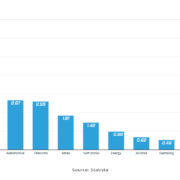With the entrance of B2B companies into the sports sponsorship landscape, technology companies are driving transformation within sports organizations. For instance, nearly 40% of The Olympic Partner (TOP) sponsors are technology partners. While technology has been playing a prominent role in the planning of the Olympic Games, Tokyo 2020 saw many new digital initiatives and technologies being applied for the first time in the Games. Some of the new technologies came from some of the TOP sponsors such as Alibaba Group providing an innovative broadcasting solution that is completely hosted on the Alibaba cloud. This partnership solution transformed the media industry with numerous benefits like immediate delivery of short form content and remote editing.
Atos, another TOP sponsor of the Olympic Games, provided digital solutions to Tokyo 2020 including the Games Management Systems to deliver real-time results to the media and the Olympic ecosystem. The implementation of these digital solutions helped the Olympic website reach nearly 5M users just during the first days of the Olympic Games.
We expect this trend to continue in the Beijing 2022 Winter Olympic Games that commences on the 4th of February 2022. The last time Beijing hosted the 2008 Summer Olympic Games, one of the three stated visions was to create a “High-Tech Olympics”. According to the Beijing Organizing Committee for the Games of the XXIX Olympiad (BOCOG), out of the published operating budget of US$2 billion, they had invested nearly $400 million for 449 science and technology projects. Fast forward to the Beijing 2022 Winter Olympic Games, they have tested more than 300 types of technologies in various areas of the event. This high tech will aim to reduce carbon emissions, ensure the safety of the event, support COVID-19 measures and create a better viewing experience for fans.
ENHANCING THE BEIJING 2022 OLYMPIC EXPERIENCE THROUGH DIGITAL
Broadcasting
In 2016, the International Olympic Committee (IOC) created “The Olympic Channel”, an OTT platform where fans can discover, engage and share their excitement of the Olympic Games all year round. The platform offers original programs, news, live sports events and highlights 24/7 in 12 different languages. The launch of this OTT proved to be a great opportunity for the future Olympic Games to build fan groups and digital content for different regions.
With one billion internet users in China, the Beijing 2022 Olympic Winter Games has raised the bar with digital at the heart of the event. Alibaba, one of the TOP sponsors of the Olympic Games, in collaboration with the Olympic Broadcasting Services (OBS), will provide its cloud-based broadcasting technology that will remove the need for a physical IT infrastructure and decentralize the workflow. The technology will process videos on the cloud before being transmitted to the TV stations thus reducing the need for program producers to be physically on-site. This will increase the amount of content that will be produced and delivered from remote sites to any part of the world. The exchange of these data will be accelerated with the introduction of a 5G network at venues and roads between venues hosted by China Unicom, the official telecom provider for the Beijing 2022 Olympic Winter Games. It will allow fans, journalists and athletes instant access to video live streaming and enable seamless connectivity throughout the event.
5G signals will also allow high-definition broadcast on VR devices so that international audiences can attend events virtually. International audiences will be introduced to never seen before camera angles, 360-degree replays, 4k to 8k live streaming capability and more analytical data processed by Artificial Intelligence (AI). A set of cameras will be deployed around the competition that will shoot videos from different angles and allow the fans to choose the angle that best suits them.
Fans getting closer to the athletes
Athletes hold great potential in event storytelling as they can create content and distribute it for closer engagements with the fans. The Beijing 2022 Olympic Winter Games will introduce the “Athlete Moment” where an athlete can video call their loved ones immediately after their performance in a virtual hug that can reach the whole world. Samsung as part of their TOP sponsorship deal will provide a customary Olympic Games Edition smartphone to all the athletes so that they can stay connected to the world. Fans around the world can also connect with athletes through Airbnb Olympian Experiences which will provide direct earning opportunities for athletes and include everything from the chance to train virtually with an Olympian, to exploring a city with an elite athlete. Overseas fans can also cheer for their favorite athletes through ´Remote Fan´ digital apps where they can interact with live events using the cheer button or upload a short selfie video showing their passion.
High-tech wearables
The Beijing 2022 Olympic Winter Games will also see an advanced role being played by high-tech wearables. For ice and snow events, athletes will wear a portable cardiopulmonary function test instrument that displays the oxygen uptake, blood lactate, riding power and other body indicators on the screen. For preventing a COVID outbreak, the venues will also be installed with intelligent thermometric patches that constantly monitor a person’s body temperature and detect abnormal temperatures accurately. In order to enhance the physical experience, attendees will be able to make purchases with wearables like smartwatches or bracelets or they can also use a digital currency called e-RMB, which mirrors the value of the Chinese currency. Adhering to the weather conditions, there is even a set of gloves equipped with an e-RMB wallet module which was also implemented at the PyeongChang 2018 Winter Olympic Games.
WHAT'S N3XT
Technology will play a key role in not only enhancing the Olympic Games experience for athletes and all participants but also benefit urban development in the hosting areas and improve the digital capabilities of the organizations involved. The target of hosting the high-tech Olympics will be to create smart cities, smart digital infrastructures and the latest tools to engage the fans in the most efficient ways.
On the fan experience side, technology could change how fans interact with the Olympic brand and vice versa. Personal engagement will be prioritized as consumer habits change and a customized experience will be a must. The Olympic Virtual Series 2021, the first-ever Olympic esports licensed event was a pilot move towards a new, unique Olympic digital experience that aimed to grow direct engagement with new audiences in the field of virtual sports. It was targeted at maximizing online participation and creating a stage to connect the physical world with the virtual. Esports could be a gamechanger in reaching those untapped audiences if it is ever included in the Olympic Games.
Tech companies will keep advancing into the sports industry with their latest technology and organizations need to be prepared for the changing times. Our expertise in this domain can help your organization understand the necessary transformation steps and accompany you in executing it efficiently. Fill out the form below and our team will get in touch!



